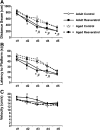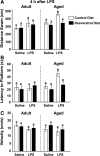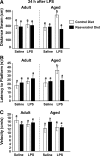Consuming a diet supplemented with resveratrol reduced infection-related neuroinflammation and deficits in working memory in aged mice
- PMID: 20041738
- PMCID: PMC2903454
- DOI: 10.1089/rej.2009.0888
Consuming a diet supplemented with resveratrol reduced infection-related neuroinflammation and deficits in working memory in aged mice
Abstract
Aged mice treated peripherally with lipopolysaccharide (LPS) show an exaggerated neuroinflammatory response and cognitive deficits compared to adults. Considerable evidence suggests resveratrol, a polyphenol found in red grapes, has potent antiinflammatory effects in the periphery, but its effects on the central inflammatory response and cognitive behavior are unknown. Therefore, the current study investigated if resveratrol dietary supplementation would inhibit neuroinflammation as well as behavioral and cognitive deficits in aged mice given LPS to mimic a peripheral infection. In initial studies, adult (3-6 months) and aged (22-24 months) mice were provided control or resveratrol-supplemented diet for 4 weeks and then injected intraperitoneally (i.p.) with saline or LPS, and locomotor activity and spatial working memory were assessed. As anticipated, deficits in locomotor activity and spatial working memory indicated aged mice are more sensitive to LPS compared to adults. More importantly, the LPS-induced deficits in aged animals were mitigated by dietary supplementation of resveratrol. In addition, resveratrol consumption reduced LPS-induced interleukin-1beta (IL-1beta) in plasma and the IL-1beta mRNA in the hippocampus of aged mice. Finally, pretreatment of BV-2 microglial cells with resveratrol potently inhibited LPS-induced IL-1beta production. These data show that aged mice are more sensitive than adult mice to both the inflammatory and cognitive effects of peripheral immune stimulation and suggest that resveratrol may be useful for attenuating acute cognitive disorders in elderly individuals with an infection.
Figures







Similar articles
-
Peripheral lipopolysaccharide (LPS) challenge promotes microglial hyperactivity in aged mice that is associated with exaggerated induction of both pro-inflammatory IL-1beta and anti-inflammatory IL-10 cytokines.Brain Behav Immun. 2009 Mar;23(3):309-17. doi: 10.1016/j.bbi.2008.09.002. Epub 2008 Sep 12. Brain Behav Immun. 2009. PMID: 18814846 Free PMC article.
-
Luteolin inhibits microglia and alters hippocampal-dependent spatial working memory in aged mice.J Nutr. 2010 Oct;140(10):1892-8. doi: 10.3945/jn.110.123273. Epub 2010 Aug 4. J Nutr. 2010. PMID: 20685893 Free PMC article.
-
Resveratrol inhibits inflammatory responses via the mammalian target of rapamycin signaling pathway in cultured LPS-stimulated microglial cells.PLoS One. 2012;7(2):e32195. doi: 10.1371/journal.pone.0032195. Epub 2012 Feb 21. PLoS One. 2012. PMID: 22363816 Free PMC article.
-
Minocycline attenuates lipopolysaccharide (LPS)-induced neuroinflammation, sickness behavior, and anhedonia.J Neuroinflammation. 2008 May 13;5:15. doi: 10.1186/1742-2094-5-15. J Neuroinflammation. 2008. PMID: 18477398 Free PMC article.
-
Malaise in the water maze: untangling the effects of LPS and IL-1beta on learning and memory.Brain Behav Immun. 2008 Nov;22(8):1117-27. doi: 10.1016/j.bbi.2008.05.007. Epub 2008 Jul 21. Brain Behav Immun. 2008. PMID: 18640811 Free PMC article. Review.
Cited by
-
Inflammatory modulation of exercise salience: using hormesis to return to a healthy lifestyle.Nutr Metab (Lond). 2010 Dec 9;7:87. doi: 10.1186/1743-7075-7-87. Nutr Metab (Lond). 2010. PMID: 21143891 Free PMC article.
-
Myricetin prevents sleep deprivation-induced cognitive impairment and neuroinflammation in rat brain via regulation of brain-derived neurotropic factor.Korean J Physiol Pharmacol. 2022 Nov 1;26(6):415-425. doi: 10.4196/kjpp.2022.26.6.415. Korean J Physiol Pharmacol. 2022. PMID: 36302617 Free PMC article.
-
Phenolic Compounds Characteristic of the Mediterranean Diet in Mitigating Microglia-Mediated Neuroinflammation.Front Cell Neurosci. 2018 Oct 23;12:373. doi: 10.3389/fncel.2018.00373. eCollection 2018. Front Cell Neurosci. 2018. PMID: 30405355 Free PMC article. Review.
-
Role of BDNF Signaling in the Neuroprotective and Memory-enhancing Effects of Flavonoids in Alzheimer's Disease.CNS Neurol Disord Drug Targets. 2024;23(8):984-995. doi: 10.2174/1871527323666230912090856. CNS Neurol Disord Drug Targets. 2024. PMID: 37702162 Review.
-
Hidden attributes of zymosan in the pathogenesis of inflammatory diseases: A tale of the fungal agent.Iran J Basic Med Sci. 2023 Apr;26(4):380-387. doi: 10.22038/IJBMS.2023.67365.14770. Iran J Basic Med Sci. 2023. PMID: 37009011 Free PMC article. Review.
References
-
- Avital A. Goshen I. Kamsler A. Segal M. Iverfeldt K. Richter-Levin G. Yirmiya R. Impaired interleukin-1 signaling is associated with deficits in hippocampal memory processes and neural plasticity. Hippocampus. 2003;13:826–834. - PubMed
-
- Pugh RC. Fleshner M. Watkins LR. Maier SF. Rudy JW. The immune system and memory consolidation: a role for the cytokine IL- 1beta. Neurosci Biobehav Rev. 2001;25:29–41. - PubMed
-
- Ben Menachem-Zidon O. Goshen I. Kreisel T. Ben Menahem Y. Reinhartz E. Ben Hur T. Yirmiya R. Intrahippocampal transplantation of transgenic neural precursor cells overexpressing interleukin-1 receptor antagonist blocks chronic isolation-induced impairment in memory and neurogenesis. Neuropsychopharmacology. 2008;33:2251–2262. - PubMed
-
- Godbout JP. Chen J. Abraham J. Richwine AF. Berg BM. Kelley KW. Johnson RW. Exaggerated neuroinflammation and sickness behavior in aged mice following activation of the peripheral innate immune system. FASEB J. 2005;19:1329–1331. - PubMed
Publication types
MeSH terms
Substances
Grants and funding
LinkOut - more resources
Full Text Sources
Other Literature Sources
Medical
Research Materials

